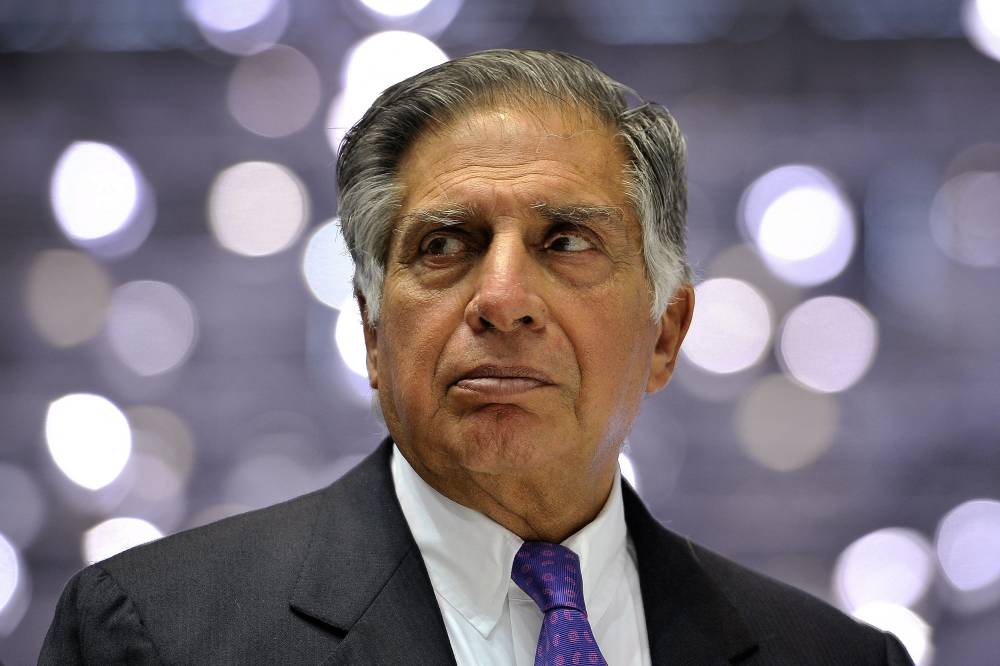India's business icon Ratan Tata dies at 86
Tata headed Tata Sons, the holding company of the Tata Group, for 21 years, and enjoyed an elevated status among the country's powerful industrial elite.

NEW DELHI - Ratan Tata, an Indian business legend and the vast Tata Group conglomerate's former chairman, died on Wednesday at the age of 86.
Tata headed Tata Sons, the holding company of the Tata Group, for 21 years, and enjoyed an elevated status among the country's powerful industrial elite.
"It is with deep sorrow that we announce the peaceful passing of our beloved Ratan," his family said in a statement.
The conglomerate controls companies involved in an array of products and services including salt, steel, software, airlines, energy, chemicals, telecommunications, hotels and military systems.
Tata, who died in a Mumbai hospital, will be given a funeral with full state honours.
A member of the tiny Parsi Zoroastrian community, Tata was instrumental in the group's global expansion as India shifted gears in the 1990s to become a more open economy after the post-independence decades of dreaded state controls known as the "licence raj".
He led the group's expansion into new areas and high-profile acquisitions, which included British luxury car brands Jaguar and Land Rover in 2008, Tetley Tea deal in 2000, and the purchase of Anglo-Dutch steelmaker Corus in 2007.
Tata joined the family-controlled group in 1962, initially working on the shop floor of Tata Steel.
He took over the reins in March 1991 from his uncle Jehangir Ratanji Dadabhoy Tata, popularly known as J.R.D. Tata, who helmed the group established in 1868 by Jamsetji Nusserwanji Tata, for half a century.
Ratan Tata was given the honorary title of Chairman Emeritus of Tata Sons, Tata Industries, Tata Motors, Tata Steel and Tata Chemicals after serving the group as chairman from 1991 to 2012.
"For the Tata Group, Mr Tata was more than a chairperson. To me, he was a mentor, guide and friend. He inspired by example," said Natarajan Chandrasekaran, the group's current chairman.
Chandrasekaran in 2017 became the first non-Parsi chief of the group after Cyrus Mistry of the billionaire Shapoorji Pallonji family was ousted in a boardroom battle with Tata in October 2016.
Mistry, whose family is a key shareholder in Tata Sons, died in a road crash in 2022.
Tata was admired for his leadership of the group, which held on to its traditional values despite India's business scene getting more crowded with a new generation of flashy tycoons known as Bollygarchs.
Ordinary Indians as well the country's political and business elite mourned his passing away in social media posts.
Prime Minister Narendra Modi called Tata "a visionary business leader, a compassionate soul and an extraordinary human being" and lauded his contributions to society.
"He endeared himself to several people thanks to his humility, kindness and an unwavering commitment to making our society better," Modi said.
Indian National Congress president Mallikarjun Kharge described him as "an invaluable son of India" who was committed to inclusive growth.
"He was an inspiration and an icon for millions of people and richly contributed to nation building," Kharge said.
Many remembered him for leading philanthropic initiatives.
America's Cornell University, from where he received a degree in architecture in 1962, said he was the institution's most generous international donor.
"India's economy stands on the cusp of a historic leap forward. And Ratan's life and work have had much to do with our being in this position," businessman Anand Mahindra said.
In one of his most famous projects that failed to meet expectations, Tata launched a small car known as the Tata Nano.
Dubbed as "the people's car", designed as a cheap option for people who commuted on two wheelers, its production was discontinued in 2019 due to various reasons, including low sales and new regulations.
However, Tata's legacy will be in his ability to grab big-ticket opportunities for foreign acquisitions and local expansion created by the post-1991 market reforms while staying loyal to the group's traditional values in employee welfare and philanthropy.
He experienced an India which placed such severe restrictions on foreign currency transfers that he struggled to meet his US student expenses while also living in an era that facilitated his multi-billion-dollar foreign deals without much fuss. - BERNAMA









